Learn about key design elements for 21st century STEM facilities that meet the needs of the entire campus community.
During this conference, you will discover how you can design or renovate your STEM facility to incorporate best practices in teaching spaces, laboratories, and communal spaces. This event has helped countless planning teams get on the same page and work toward common goals for their updated facility. You will hear from a mix of both academic and architectural perspectives, visit a recently renovated facility, and learn how to design a STEM facility for your institution that helps:
- Recruit and retain high-quality STEM students and faculty
- Enable and enhance interdisciplinary collaboration and learning
- Optimize lab, classroom, and learning spaces
- Incorporate flexible design to accommodate advances in STEM
- Increase the efficiency and sustainability of your space and budget
- Align research and instruction in a single facility
When two members of your team register, a third can attend for 50% off the registration price.
Site Visit: Virginia Wesleyan University, Greer Environmental Sciences Center
A unique aspect of our STEM facilities conference is the opportunity to visit a recently opened facility and ask questions of the individuals who made it possible. This year we are heading to Virginia Wesleyan University’s Greer Environmental Sciences Center. We will get an in depth tour that focuses on:
- Environmental sustainability
- Indoor and outdoor collaborative learning spaces
- State of the art laboratories
- Teaching spaces that promote interdisciplinary research and research partnerships
The site visit for this event is consistently rated as a highlight for participants and will allow you to see working examples of the concepts we discuss during the rest of the training.
Post-Conference Workshop: Project Construction Success Strategies
This post-conference workshop will help you plan through the critical steps in your construction timeline. You will hear best practices for ensuring that your project can stay as close to your outlined timeline as possible while avoiding common pitfalls along the way.
Bring Your STEM Facilities Team and Save
Bring your team of STEM faculty, facilities directors, campus and capital planners, academic leadership, key faculty, project managers, campus architects, sustainability leaders, and chief financial officers. These groups will benefit from a shared conversation on the positive impact that new or renovated STEM facilities can have on the academic mission of your institution.
When two of your team members register, a third can attend for 50% off the registration price.

Agenda
DAY ONE
Conference Registration
12:30 - 1:00 p.m.
Welcome and Introduction
1:00 - 1:30 p.m.
Establishing Your Starting Point for 21st Century Design Principles on Your Campus
1:30 - 2:15 p.m.
Where are you now in terms of understanding your current STEM facility needs? This session will give you an opportunity to assess your current facility relative to the themes of this program: 21st century design considerations. You will also have an opportunity to participate in a guided discussion with peer institutions about your current STEM climate and where you are in the design process.
Connecting Pedagogy with Facility Design: STEM Considerations for 21st Century Learners
2:15 - 3:15 p.m.
The heart of a dynamic, flexible, and innovative STEM facility is the situated, hands-on learning that transpires in this space. This session will highlight key pedagogical and curricular shifts that are influencing instructional space, layout, and connectivity considerations. Our expert will guide you through current design models such as SCALE-UP that enhance student retention and success in STEM.
Afternoon Break
3:15 - 3:30 p.m.
Key Design Elements to Empower your STEM Community
3:30 - 5:00 p.m.
Our experts will share details of several STEM facility projects that highlight the key design elements that foster productive collaboration and are having an impact on STEM right now. You will hear about design elements from University of Oklahoma, Gallaudet University, University of Denver, and Virginia Tech. We will look at design decisions made for programs including biology, chemistry, and engineering. You will learn how these projects:
- Dramatically impacted campus access points
- Improved the experiential learning environment across disciplines
- Shaped university expansion and supported mission attainment
- Radically enhanced communication between faculty and students
Working Session: Addressing the Needs of Individuals Using Your STEM Facility
5:00 - 5:30 p.m.
There will be a lot of information in this event related to the impact of your facility on the entire STEM community. Who is in that community exactly and what can we already anticipate about their needs? This session will be an opportunity to better understand who those community members are and share on the importance of involving them in the visioning and planning phases of your STEM facility project.
Networking Reception (included in registration fee)
5:30 - 6:30 p.m.
DAY TWO
Continental Breakfast (included in registration fee)
8:00 - 8:30 a.m.
Aligning Learners and Lab Spaces: Modern Design for Learner Engagement
8:30 - 9:45 a.m.
This in-depth session will focus on one of the most challenging design aspects in a STEM facility: the academic lab. You will hear from our experienced lab designer about the innovative and successful approaches that colleges and universities are utilizing to create exciting opportunities for their students.
Working Session: Lab Space Planning
9:45 - 10:30 a.m.
In this working session, you will have the opportunity to work through a lab space planning exercise. Picking up from where you left off in defining your community members, this session will take this process further and help you clarify your lab space needs relative to your users based on their needs and the key design elements.
Morning Break
10:30 - 10:45 a.m.
STEM Facility Case Study: Immersing the Entire Campus
10:45 - 11:45 a.m.
This hour will highlight the mindset and design process that fulfilled a university’s mission to expand research opportunities to their undergraduates. You will learn strategies for:
- Developing unique approaches to managing local infrastructure
- Establishing facility driven research partnerships
- Incorporating sustainable strategies as teaching tools
- Using shared labs as magnets for cross-disciplinary collaboration
Lunch (included in registration fee)
11:45 a.m. - 1:00 p.m.
Facilities Tour: Virginia Wesleyan University, Greer Environmental Center
1:00 - 3:00 p.m.
Through a guided tour, you will visit the Greer Center’s research labs and teaching and learning spaces to learn about the key design decisions and their impact.
Break
3:00 - 3:15 p.m.
Panel Discussion: Virginia Wesleyan STEM Facility Team
3:15 - 4:00 p.m.
Join us for an open discussion with the members of the project team to learn more about their approach and the impact of the facility on their end users.
DAY THREE
Continental Breakfast (included in registration fee)
8:00 - 8:30 a.m.
Debrief STEM Facilities Tour
8:30 - 9:00 a.m.
After a good night’s sleep, you will share on insights gained from the site visit and suggest elements you would like to incorporate into your own facility.
Participatory Design Methods to Engage the STEM Community
9:00 - 10:30 a.m.
There are specific methods you can deploy on your campus to educate and involve the entire campus community. This session will model these strategies and methods by providing you a first-hand experience of how to educate and involve faculty and STEM community members in visioning exercises, design thinking, and most importantly, sharing the vision and involving faculty every step of the way.
Consulting Session: Strategies for Selection and Communication with Your External Team
10:30 - 11:30 a.m.
You will be provided strategies for selection and communication with an external project team and an opportunity to ask our specialists questions relevant to the needs of your specific institution.
Action Planning
11:30 a.m. - 12:00 p.m.
During this final segment, we will guide you through goal setting and action items.
Lunch for Post-Conference Workshop Attendees (included in post-conference workshop registration)
12:00 - 1:00 p.m.
Post-Conference Workshop: Establishing and Actualizing a STEM Facility Construction Timeline
1:00 - 4:00 p.m.
Those who have opened a new STEM facility on their campus can tell you that facility design is perhaps half the challenge. Actualizing design and carrying out your project’s punch list complicates the process for even the most well-planned projects.
This post-conference session is designed to help you plan through the necessary steps in this cumbersome process. Our expert facilitator will be on hand to present best practices and discuss pitfalls to avoid throughout your project timeline. Included in this three-hour workshop will be an opportunity for you to work through key planning considerations, including:
- Realistic timelines for crucial steps in the construction process
- Anticipating and minimizing construction impact
- Crucial benchmarking tactics to inform project design and cost considerations
- Proven methods for communicating with 3rd party designers and architects
![]()
Speakers
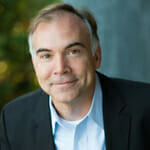
Joe Atkins
Joe has more than 25 years of experience designing iconic buildings and landscapes for college and university campuses. Joe brings clear conceptual thinking, strong design vision, and diligent attention to detail to each of his engagements. Many of his designs, such as for Virginia Wesleyan University’s Greer Environmental Sciences Center, integrate thoughtful programming and place-based architectural strategies to uplift and transform campus settings. He is particularly adept at distilling the needs and desires of a wide spectrum of stakeholders and responding with inspired architecture. He believes that finding and elevating what is unique about each campus lays the groundwork for a successful project.
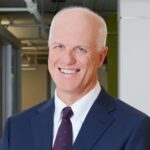
David McCullough
David has been promoting quality science environments as an architect and lab planner for large and small academic institutions for the last 28 years, including 18 years with the national consulting firm of SST Planners and, since 2015, as a principal with the national architecture firm of Page as the firms were joined. He has a distinguished record of assisting institutions with developing a clear programmatic and architectural vision for STEM learning and science research spaces. David believes strongly in the essential place of STEM education and strives for a continuum between introductory STEM environments and the exciting world of academic research and technology development. He has extensive work in higher education including MIT, Brown University, Virginia Tech and many others and his expertise crosses interdisciplinary boundaries. Recent collaborative work includes transformative STEM projects at the Wentworth Institute of Technology in Boston, Virginia Wesleyan University, Gallaudet University, Hollins University, Moravian College and the University of Oklahoma among others. For Western Carolina University he has been a programming consultant for their new 185,000 GSF STEM Building now under construction. He is a gifted presenter and instructor and is enthusiastic about making science spaces that lead to successful lifelong learning outcomes and have an impact felt throughout the campus. David has a Master of Architecture from MIT where he also served as an instructor and has engineering degrees from N.C. State. He began his architectural career working on campus projects with Michael Dennis and Ayers Saint Gross.
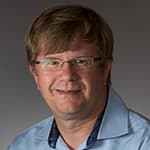
Mark Eliot Rodgers
Mark has been deeply involved in the design and delivery of every project at the University of Denver over the last two decades. His most recent experience is with the building that will house the Daniel Felix Ritchie School of Engineering & Computer Science + the Knoebel Institute for Healthy Aging (DFR SECS +KI), the cornerstone of the University of Denver’s commitment to growing its academic and research STEM facilities. His responsibilities range from the initial programming and design to adapting projects years after construction – allowing him to garner a rare understanding of how buildings serve an academic institution for many years beyond completion. Following upon Cabell Childress and Chancellor Emeritus Ritchie’s initial design direction, Mark has continued the challenging work of unifying the University Park Campus in a manner that embraces its distinguished history, accounts for the necessity of enduring design, and celebrates an enthusiasm for DU’s future. As is exemplified with the design, layout, and location of the new building for DFR SECS+KI, he is well known for encouraging projects that celebrate and promote the unique strengths of the programs housed and creating warm and inviting spaces with the recent renovation of the Penrose Library (originally built in 1972) into the Anderson Academic Commons that re-opened in March of 2013 another notable example.
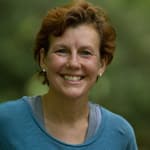
Jill Sible
Jill Sible led an innovative cell biology research program for a decade before moving into university administration seven years ago with the goal of improving the undergraduate learning experience. She introduced her campus to the SCALE-UP concept and spearheaded the design and construction of SCALE-UP classrooms, as well as the adoption of the associated pedagogy at Virginia Tech. She has led over $9M in sponsored research projects, including $5M in STEM education grants. She is currently the lead investigator for projects funded by the National Science Foundation and National Institutes of Health, which focus on increasing success, retention, and diversity among undergraduate programs in STEM. Sible is a National Academic of Sciences Education Fellow in the Life Sciences. Her current projects include leading a dramatic revision of Virginia Tech’s general education curriculum to be more integrated, outcomes-oriented, and infused with contemporary pedagogy. She has also worked on the vision and programming for Virginia Tech’s new classroom building, scheduled for occupancy fall 2018. Sible has taught courses in cell and molecular biology, developmental biology, and cancer biology; she cites the learning experiences she shares with her students as her greatest professional reward.
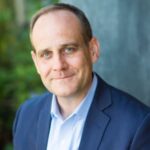
Dade Van Der Werf
Dade Van Der Werf, AIA, LEED AP BD+C, has nearly twenty years of experience working for prominent architectural firms and institutions of higher education up-and-down the east coast. Dade has established himself as a key contributor to VMDO’s higher education concentration, including the recent design of Virginia Wesleyan University’s Greer Environmental Sciences Center. Dade’s varied experience and deeply involved approach produce creative designs that are well-informed and functionally sound. His careful project management style and extensive experience ensure that projects are delivered on-time and under-budget.
Questions About the Event?

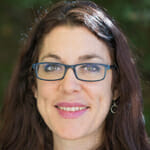
Grace Royal
Program Manager, Academic Impressions



